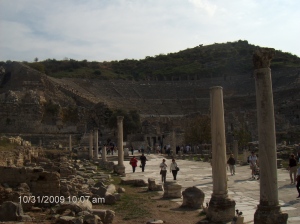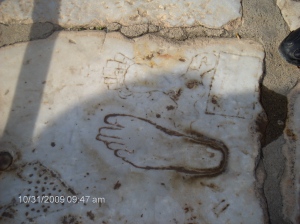Casting Lots is the story of the Centurion at the crucifixion. My novel explores the life of the Centurion both before the crucifixion and after to try to understand why this Roman Army Officer would speak out at the crucifixion proclaiming Jesus, whom he could not have viewed before the crucifixion except as anything other than another enemy of Roman getting what he justly deserved.
In this blog, I will start to examine the language of the outcry as recorded in the three Gospels which document the event. [As an aside, the Gospel of John does not directly record this event, but has a most interesting passage which reads: “The man who saw it has given testimony and his testimony is true. He knows that he tells the truth, and he testifies so that you also may believe.” John 19:35. Is this the same statement as in Luke 278:48?]
First what is said in each of the Gospels? In the Gospel of Matthew, the Centurion says, “Truly, this was a son of God.” This is also often translated as: “Truly, this was the son of God.” In the Gospel of Mark, which scholars believe was written before the other four Gospels, Mark records the Centurion as saying, “Truly, this Man was a son of God” or as “Truly, this Man was the son of God”. The issue of whether the article is “a” or “the” might be a misleading issue. In Latin, the language in which presumably the Centurion spoke, there are no articles. In Homeric Greek and in Koine Greek, there is only one article, which is usually translated as “the”. In Luke, on the other hand, it is recorded that the Centurion said, “Certainly this was a righteous Man.” or as it is often translated: ““Certainly this was an innocent Man.”
There are things upon which two of these three Gospels agree, but there is only one thing upon which all three agree: The Centurion made an outcry after the death of Jesus and what he said was so startlingly, so out of character and so amazing that it had to be recorded. First, two of the Gospels have the Centurion saying that Jesus was a special or extraordinary man (Luke and Mark): whether he was an innocent man or a righteous man or man who is the son of God, he is nonetheless a very special man. A man so special in his characteristics that the centurion after but a brief while with him recognized him to be such and so proclaimed him to the world. Remember that at the crucifixion, there were the Disciples of Jesus, his mother and at least three other women, the Roman Army detachment that crucified him, the two thieves, Scribes, Pharisees, as well as a number of other on-lookers. The Centurion is remarking that Jesus is no ordinary man. He has been marked by God. This determination by one who should not care about making that determination rivets our attention.
In two other Gospels, Jesus is either “a” son of God or “the son of God”, but nevertheless the words “son of God” are used (Matthew and Mark). Any framing by the Centurion of Jesus as being either a son of God or the son of God is utterly shocking. If Jesus is divine in any sense, then are the charges against him by the Priests, Scribes and Pharisees valid? How does it come to pass that a Centurion sees Jesus as being innocent, as does Pontius Pilate, and his wife?
Does the fact that the Gospels differ in the recording of what the Centurion said mean that there is a contradiction amongst them? Not necessarily. It is human nature not to remember exactly the words spoken at an event. If we add in the fact that the Gospels were written certainly years, if not decades, after the crucifixion, then it is more likely that the exact words may have been forgotten. Nonetheless, the first two Gospels are amazingly the same.
What about the very different utterance recorded by Luke? Is it possible that the Centurion said both things, which is that Jesus was an innocent man and was a son of God? Certainly, this is quite possible. This would merely require that the Evangelists emphasized different things because the different utterances struck them as being more meaningful.



